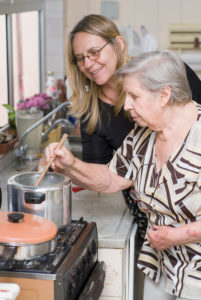As your parents age, it may be more difficult for them to take care of daily tasks and responsibilities. Simple self-care becomes more challenging and taking care of tasks around the house may be more daunting than it’s ever been before. Simply charging in and taking over, however, won’t help you or your aging loved one. Not only will it add a heavy dose of responsibility to your shoulders, it may be hard on your parent’s self-esteem or feelings of independence. By learning how to balance those key tasks, you can improve your interactions with your parent while ensuring they get the care they need.

1. Let Them Lead
For many years, your parent was responsible for taking care of themselves–and for taking care of you! As they age, they still need to lead the self-care process as much as possible. It may take longer to wait patiently for your parent to complete a task when they’re the one leading the way, but providing them with that extra independence can help improve their self-esteem and make them feel more capable even as their physical abilities deteriorate.
2. Ensure Their Health
After hospital stays or a new medical diagnosis, your aging loved one may need more care than before. Take care to monitor medication to ensure that they’re taking it properly, especially if forgetfulness is setting in. It may also be helpful to attend doctor’s appointments with them, particularly after a new diagnosis or injury.
3.Address Emotional Needs, Too
It’s easy, as an adult child, to get caught up in your parent’s physical needs. There are so many things to take care of, especially when you’re balancing the need to keep up with their needs as well as your own. It’s important, however, to keep an eye on emotional needs as well as physical ones. Take the time to sit down and have a genuine conversation. Exchange kind words. Make sure to evaluate your parent’s emotional state and take action if they seem to become depressed or anxious. These simple steps can have a big impact on your loved one over time!
4. Remain Respectful
Your parent has not become a child in spite of the fact that they now need your help and care. When interacting with your parent, be respectful! Keep in mind that they still have the right to make their own choices, and you should ask for their opinion before making a choice for them. Take the time to think through how your actions will impact them, especially if you’re making decisions that may reduce their independence.
5. Prepare the Home
You’re well aware that certain hazards increase as your loved one ages. Keep an eye on potential fall hazards and problems in the kitchen, bathrooms and around the rest of the house. You don’t want to sweep in and take over, but you do want to be sure that the home is as safe as possible! Take the time to remove cords and unnecessary clutter from common areas. When necessary, install grab bars in the bathroom to help your loved one keep their balance. As you take these simple steps, you’ll help ensure your loved one’s safety.
Providing care for an aging parent or loved one can be a struggle, but doing so respectfully and lovingly is well worth the effort. Remember, our Elderlink Home Care, Inc. team has over 30 years of experience helping our clients age gracefully and comfortably in their own homes. If you are struggling or need help, we are ready to lend a helping hand. Call us on (303) 734-0641 today to learn how we can help provide the care your loved one needs.
